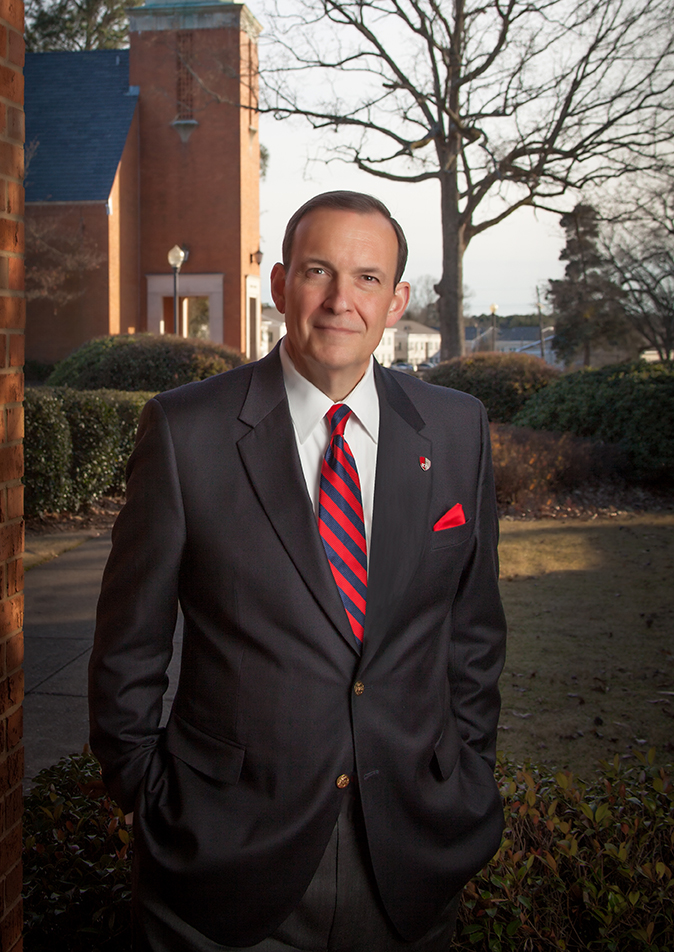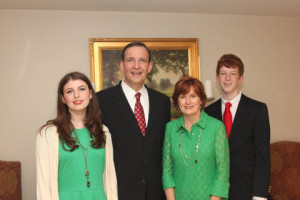
Reformed Theological Seminary was founded in Jackson in 1966. Today it is the largest reformed evangelical seminary in the world. With campuses in Jackson, Orlando, Charlotte, Atlanta, Washington, Memphis, and Houston, RTS students come from 50 different countries and as many as 60 different denominations. There is also a virtual campus where students are able to do the majority of their course work online. Following the tenets of Reformed theology and Biblical inerrancy, the seminary offers several different degrees and preparation for careers in missions, counseling, and Christian education, as well as traditional ministry. Dr. Duncan says, “This seminary has always wanted to be about evangelism and missions and pastoral work. So our little motto is ‘a mind for truth, a heart for God, a life for ministry.’ I want the evangelical world to always know that at RTS, they’re the ‘Bible guys’— they really believe every word of the Bible.’ I want us to provide the pastors and church leaders for the evangelical church in this crisis moment in our culture,” says Dr. Duncan. See www.rts.edu for more information.
Ligon on…
Roadblocks to Belief in a Sovereign God: “I think our fundamental problem is that we are all idolaters. And when it gets down to it—that is the temptation of the Garden. The serpent looked at Eve and Adam and said, ‘God is not worth living for.’ And every single one of us has that play out every day. A person can say, yes, all of this Bible and Christianity stuff is nice, but the place where I’m really going to find joy is in my ‘fill in the blank.’ Whatever you think is going to give you ultimate satisfaction in life is what you worship. And so the real challenge as you share the gospel is to let people know that God is the ultimate joy and treasure and satisfaction and delight in life. If you don’t have Him, nothing else matters because nothing else measures up and nothing else can last.”
Applying Romans 8:28 in the Real World: And we know that for those who love God all things work together for good, for those who are called according to his purpose. “The older I grow, the more I have come to believe that a person’s confidence that God loves them and is working for their good is actually key to a person being able to continue in the Christian life. Romans 8 is all about convincing Christians that God loves us, that all of his plans for us are good even if what we are going through itself is not good, and that his purposes are for our blessing and not for our harm. Christians have the ability to look at horrible situations with our eyes wide open and say, ‘yes, that’s as bad as it sounds when I say it out loud, but I believe that God is working for my good.’ Romans 8 is key to your assurance in hard times.”
Advice to Every Believer: “Know your Bible better. I think for all of us, knowing our Bible is very, very important for living the Christian life. And then know theology. Know the truth. Knowing the gospel is hugely important for living the Christian life. We’ve lived through about 40 years now in the evangelical culture where both of those things actually have been downplayed.”
Ligon Duncan is not a “glass-half-empty” kind of guy. Dr. Duncan, who was installed as the fifth Chancellor and CEO of Reformed Theological Seminary this past January, has literally spent the last 40 years striving to serve Christ anywhere and everywhere. And in this culture where it so often looks like the church is in great decline, that Christians are an increasingly marginalized minority, and the winds of political fortune are not going our way, Ligon speaks with confidence and an undeterred enthusiasm about “a tremendous gospel opportunity we have at this moment.” It is easy to understand why he inspires others to get on board with his vision.
When Ligon assumed his present position at RTS, he was no stranger to the institution. Although he is most recognized in the local community as the long time pastor and Sunday morning broadcast face of First Presbyterian Church in Jackson, he has been a familiar presence among the faculty at RTS since 1990. The Greenville, South Carolina, native came to RTS as an adjunct professor, freshly degreed and credentialed from studies at Covenant Theological Seminary in St. Louis, Missouri, and the University of Edinburgh, Scotland. Although he has spent much time over the past 24 years speaking, writing, preaching, and leading on a national and international level, Jackson and RTS have been a constant in his life.
The Pastorate at First Presbyterian Church

In 1996, the First Presbyterian Church of Jackson called Ligon to be their senior pastor. He was 35 years old. Thehistorical congregation was 159 years old at the time. Many of those in leadership positions had been reared in this same church. This was not a place looking for novel ideas and new ways of doing things. What they were looking for was sound Biblical teaching, reformed theology, a heart for the gospel, and a love for people.
In every way, this was an enormous and daunting task for a young man. Even for Ligon Duncan, who was already a published author, a rising star in the Presbyterian Church in America, and a popular speaker on both sides of the Atlantic, becoming the senior minister in one of the denomination’s flagship congregations was going to require every bit of God’s blessing and wisdom. He had been an assistant pastor. He had taught in the seminary and served on a church staff for 10 years, but he now stood—before 60 church elders who were his father’s age—taking the reins of a 3,000-member church and heading a church staff of 100. His first remarks revealed a humble heart.
He promised to relate to the leadership in a way that “you will know how I respect you.” The second thing he promised was that he would work hard—very hard. “I’m not sure I have anything else to offer you.”
Seventeen years later, that original platform stood firm. “I felt like I learned to do all of the things that you have to do in the pastoral ministry, and they [the Session] gave me space to do that,” he says. As he stepped down in order to take the helm at RTS, the mutual love and respect between Ligon and his elders, Ligon and his staff, and Ligon and his congregation had only grown.
Leadership on a New Level
Pastoring has its place on the seminary level as well. As Chancellor and CEO, Ligon feels a responsibility toward the many whose gifts—either in time, talents, or financial support—keep RTS moving forward. “I get to be both a friend and a pastor.” It is truly the best of both worlds!
But the leadership challenges facing an evangelical seminary in 2014 are far more complex than they were back in the 1960s when RTS was founded. Training people in the Bible and in truth, and equipping them to engage the culture, has never been more critical. “I think RTS is uniquely positioned. I want us to provide the pastors and church leaders for the evangelical church in this crisis moment in our culture.” As Ligon explains, “In my opinion, we have gone through the biggest cultural worldview mega shift, in the history of the world, just in the last 40 years. That deeply discourages a lot of people. And a lot of people just despair and they want to give up.”
Ligon Duncan is not one of them. As a very learned student of world history, he points out similar times throughout the ages when Christians faced different types of persecution, not the least of which were times of being ridiculed and marginalized by a powerful segment of society. From the earliest days of Christendom right up to the present, he cites specifics when Christians were persecuted, but held fast to their faith. Time and time again, the church not only survived but it grew significantly.
“No matter what comes our way in this culture,” he says with confidence, “you can’t stop the gospel.” Such a reality keeps Ligon upbeat and excited for the future.
Roots
The man, who has a commanding presence and a very warm personality, was pegged early on by those who knew him as a child as one who would likely make a great preacher. He, on the other hand, was not quite so sure. The oldest of three boys, Ligon was born into a family that was in the pew every time the church doors opened. His mother, a professor of music at Furman University, led the choir. (Ligon says she was always the first to arrive and the last to leave a service.) His dad, a local businessman, spent untold hours in church-related work as an elder and a devoted church leader.
When Ligon went through the communicant’s class as a nine year old, he struggled with his decision to actually join the church along with his peers. He chose not to make a public profession of his faith along with his friends. His parents had talked with him about spiritual things from his earliest years. As politically incorrect as today’s world may think it, he totally understood the concept of sin and knew he was indeed a sinner in need of a Savior. His hesitancy was only in the fact that he wanted to be sure he was making that public profession—not to please his parents—to please Christ.
Confirmation
It was during the following summer when the Duncan boys got to spend a month with their grandparents in Titusville, Florida, (near Orlando) that Ligon became comfortable with the idea of his personal public profession. Billy Graham came to Orlando that summer and Ligon heard every sermon. “It really got me thinking again about what it means to make a profession of faith in Christ and what it means to believe in Christ,” he says.
The pastor at his grandparents’ Baptist church, Joe Boatwright, was the best friend of the renowned Dr. Adrian Rogers. The 10-year-old Ligon Duncan went to talk to Dr. Boatwright and says, “He talked me through the gospel just like my pastor had done earlier.”
“From that time on, I never struggled with the reality of my profession of faith,” he says.
Grace, however, remained a difficult principle in Ligon’s life for the next few years. He believed in it, but it was still hard to wrap his highly analytical and academic brain around the fact that the perfect, omnipotent God of the universe provided this incredible thing called grace to cover and forgive the offenses of human beings.
Ligon was 14 when a Mississippian named John Hutchinson from Columbus came to direct the youth program at Greenville’s First Presbyterian. He had a profound impact on the young teenager’s life. The pieces fell into place. “I finally understood that before I had ever reached out to God in faith, He had reached out to me in grace.” Not only did the doctrines of grace become very real for Ligon, he knew—as he had not known before—that he was going to be a minister.
Study—Study—and Marriage

Graduation from high school was a mere prelude to an intense period of deeper and deeper study. At Furman University,where Ligon earned his bachelor’s degrees in History and English, he was also the business manager for the University Singers, traveling and performing throughout the United States and abroad in some of the most famous cathedrals of Europe. His musician mother had schooled him well in the appreciation of all things musical. He even studied voice with the highly revered Professor Bing Vick.
He graduated from Furman and headed to Covenant Theological Seminary in St. Louis for his Masters of Divinity and his Masters of Theology, and then to the University of Edinburgh to pursue a Ph.D. When RTS called in 1989 and asked if he would like to interview for a position, Ligon made his first trip ever to Mississippi for the interview. He was 29 years old and had very little time in the last decade to do much of anything except study. The position at RTS allowed him to use the tools and the knowledge he had accumulated. It was a wonderful opportunity.
God had a few plans of His own.
When a boyhood friend of Ligon’s came to RTS to take a course, he asked, “So, Ligon, how’s your social life?”
Ligon’s not surprising reply was, “What social life? I don’t have one.”
The friend—who, by the way, was not a psychologist—said, “Well, do you want to be married?”
That set Ligon to thinking. There was this one girl…
Anne Harley was an RTS student in the Marriage and Family Therapy program. She was from Columbia, South Carolina, and had arrived on campus the very same week as Ligon. They had had several conversations. She, too, had spent a decade of serious study and preparation for ministry. There had been one relationship that had just not worked out, and she had come to a perfect peace with the fact that maybe marriage was not God’s plan for her.
Ligon was not so interested in the girlfriends Anne kept introducing him to, but it took him three months to get up the nerve to ask her out instead. When he finally did, he says he was ready to marry her on the second date. Anne was a bit more cautious. “It was sort of like whiplash for her,” he laughs. Even so, his powers of persuasion were strong.
Their first date was on April 14, 1991, and they married on January 25, 1992.
Anne
Anne Duncan’s resume reflects a flexible and multi-talented persona. She, too, is a graduate of Furman University, although she and Ligon had totally missed each other during their college years. She started her career as an elementary school teacher in a district where there was much poverty and little parental influence and support. Her second assignment, in a much more affluent setting, continued to open her eyes to the impact of family dynamics on the students in her classroom. Economics were obviously not the only challenge facing school-age children. Anne says she found herself more concerned about the hearts and hurts of her students than she was about teaching math.
She had a great desire to know how to help in difficult situations, as well as how to support and strengthen every family with whom she came in contact. This heartfelt desire led her to graduate school at Gordon-Conwell Theological Seminary in Hamilton, Massachusetts. Leaving Columbia on a sunny day in 1980—and with her parents’ blessing—tiny, five-foot-two, red-headed Anne Harley took off by herself, her little Toyota Corolla stuffed to the gills with her earthly belongings, and drove the entire 942 miles to a place she had never been before.
The first thing she realized when she got to class was, “I was in over my head!” All of her classmates seemed to have been steeped in doctrines, scripture, theology, and had a working knowledge of terms she had never even heard. It could have been a complete defeat.
But the outgoing Anne had a great talent for meeting people and quickly endeared herself to her professors. Her willingness to work hard and her very teachable spirit opened the door to whatever catch-up tutorial the situation required. She put her nose to the grindstone and completed her course work earning a Master’s in Religious Education in 1982.
She later served as Director of Christian Education at Trinity Presbyterian Church in Montgomery, Alabama, and then First Presbyterian Church in Columbia, South Carolina. Very much a “people person” (and tagged affectionately “Reverend Red”), Anne found herself the unofficial confidante for many single women who saw her as a safe advisor and spiritual mentor. The earnest desire to offer real help to those who sought her counsel led the church to give her a sabbatical and to send her to RTS to pursue a Master’s Degree in Marriage and Family Therapy. Although her marriage to Ligon meant she never returned to Columbia to use that RTS training, she is a licensed therapist, and has \served as a college instructor of Family studies, and also a school counselor. Today, Anne serves on the faculty at Jackson Prep where she is the Director of Community Service.
Legacy

The Duncans make a good team. As Ligon’s calling and career have always required big swaths of time away from home,Anne is a very capable partner. Ligon points out that Anne is more than able to take care of herself and everybody else in his absence. Both had lived very independent lives for at least a decade before they married and had to learn all the hard lessons of marriage partnership. The whole independence thing may have required more adjustment for both of them at the start, but it has certainly been a blessing in the long run.
Things run fine when Ligon travels, but it is also so much more fun when he is home. Sarah Kennedy (17) and Jennings Duncan (14) keep life busy, and oh, so interesting.
Ligon is only 52, but he is, obviously, a planner and a thinker. He has given thought to his legacy. And it’s not about titles or degrees or ego. It’s really quite simple.
“I hope they’re able to say that he lived what he said he believed. I want my life to be consistent with what I’ve taught. And so, I want to preach the gospel and live the gospel out. I hope they would say as well, ‘he was at home and in his family life what he presented himself to be in public,’ so that there’s not some sort of a false dichotomy there between my public person and private life.”
“I hope people would see that I love the church and I love the Bible and I love the gospel and that I wanted other people to love the church, and love the Bible and love the gospel. And if—if I’m able as the leader of this institution to help the institution to be a blessing to pastors, to church leaders, to congregations, to Christians around the world in a time where we face some pretty stiff cultural headwinds—then that will be it. That is gratifying.”

